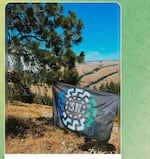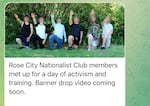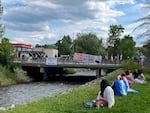The hateful messages began as soon as Michelle Lee agreed to let Oregon City Pride use the Oregon City Children’s Theater, a small performance space she owns, and an adjacent parking lot for the June LGTBQ Pride festival.
“My phone, my daughter’s phone, our business phone,” were all targeted, she said. “Some are very brief and to the point, they just kind of yell like a single word or a single phrase.”
Other messages attacked Lee because the festival’s drag show was being held in her theater and was advertised as family friendly. In the days leading up to the June 24 pride festival, Lee said she saw people taking video of the theater from across the street or through the front windows.
“They were planning,” she said.
The onslaught of hateful messages and threats forced Oregon City Pride to change the location.
Moving the festival did not deter protesters, but it did confuse them. That day, a group of people spouting neo-Nazi views showed up to demonstrate on the corner near the theater, blocks away from the new location. They wore matching khakis and black shirts and facemasks to hide their identities.
“There was a chant that they were saying about grooming,” Lee said. “Of course I could hear them, but I just chose not to engage.”

Michelle Lee, owner of Oregon City Children’s Theater, in downtown Oregon City, July 30, 2023. The theater was targeted by hate groups in June.
Jonathan Levinson / OPB
Lee, who is straight, said she often thinks about gay people she knew growing up and how unsafe they must have felt. Lee’s students range in age from 5 to 18. Leading up to the pride event, she thought it was important to show the students, some of whom identify as LGBTQ, that she was standing behind the community and not backing down.
“It was important that they know that it’s not just talking the talk. It’s walking the walk,” she said. “This event is happening, and my name is gonna remain on that poster.”
The hate group was Rose City Nationalists, a neo-Nazi organization that had recently joined a regional network of like-minded groups called the Northwest Nationalist Network emerging across the Pacific Northwest and Mountain West.
The loose network includes people and organizations with a history of racist violence, now working together to further ethno-nationalist ambitions. Members share an adoration of Adolf Hitler and the Nazi regime, and an open disdain for anyone who isn’t white, straight, cisgender and Christian.
Since May, the network has targeted six small pride events including ones in Bozeman, Montana; Lander, Wyoming; and Centralia, Washington. Experts say the new alliance and increased activity represent a troubling escalation that has been spreading across the country. In the Pacific Northwest, groups are targeting small towns and more conservative communities whose pride festivals aren’t well established or have only been happening for a few years.
“You have people traveling across state lines to target these different pride events,” said Stephen Piggott, a researcher at the Western States Center, a civil rights group. “That, to me, shows kind of a level of coordination, dedication … This is people not just showing up to something in their backyard. It’s people traveling potentially hundreds of miles or whatever to engage in that.”
Piggott said the groups could be seeking out communities where they think they’ll meet less determined resistance or where they’ll find a more sympathetic audience and have more success recruiting.
Fight clubs, with racism
The Northwest Nationalist Network includes hate groups like White Lives Matter and Vinland Rebels but also regional “active clubs,” neo-Nazi cells whose members place an emphasis on preparing for physical conflict.
A flyer shared on social media told active club members to “create displays of defiance. Show your community our culture will not be erased.”
Piggott likened them to racist fight clubs.
“It’s essentially an ideology … around getting fit and preparing for street battles, which these groups see as kind of step one in the path towards a race war,” he said. “One of the core tenets of their ideology is national socialism, admiration for the Nazi regime in the 1930s and ‘40s.”

A screenshot from the Northwest Nationalist Network's Telegram channel shows the network's flag strung up in a tree. The Sonnenrad is a Nazi symbol frequently used today by neo-Nazi and white supremacist groups.
Telegram Screenshot / OPB
Robert Rundo, the founder of the active club movement, took his inspiration from European far-right extremist groups. He has spent the past several years rubbing elbows with ultranationalists and hate groups in Eastern Europe. Rundo was arrested earlier this year in a Bucharest gym and extradited to California, where he’s facing federal riot charges stemming from 2017 street clashes with anti-fascists.
On Feb. 18, members of the Washington-based Evergreen Active Club and Portland’s Rose City Nationalists stood on a pedestrian bridge over Interstate 5 in Southeast Portland. The white nationalists held their hands straight out in a Nazi salute next to banners saying “no white guilt” and “no political solution.” It was the Northwest Nationalist Network’s first joint action. According to their promotional videos and social media accounts, the organization now includes racist skinhead groups and active clubs in Portland, Montana and Eastern Washington.
Similar networks have emerged in the South and Midwest.
On social media, the groups share videos of members practicing mixed martial arts, clips of themselves targeting pride events, hanging banners on freeway overpasses and making appeals to “young white men who are willing to fight for the PNW.”
These groups coordinate their activities via social media sites like Telegram. A mid-July post made fun of media stories saying neo-Nazi groups are embracing physical fitness and training for violence. Less than two weeks later, the group shared a 10-and-a-half minute video of a man at a punching bag with a white lives matter flag behind him, teaching viewers about the importance of being prepared for and knowing how to use violence.
“If you’re going to be a white advocate, which I think is a great thing to do, a noble sacrifice, don’t just think it’s showing up and holding a banner,” he said. “You need to go to the gym. You need to get some training in.”
He said some people in every active club or nationalist group should get professional mixed martial arts training, which they can bring back and teach to the rest of the organization.
Rose City Nationalists’ presence at the Oregon City Pride festival was short-lived. Members of the Proud Boys, a different violent far-right group and one with a far larger national profile due to its involvement in the 2021 U.S. Capitol attack, were already there demonstrating, and the two groups ultimately wound up fighting each other.

A screenshot of a photograph posted in the Rose City Nationalists Telegram channel shows the group giving Nazi salutes. Faces were blurred in the original post.
Telegram Screenshot / OPB
However brief, according to the groups’ social media videos, the demonstration was one in a weekslong, coordinated run of hate across the region. The same day the hate group showed up in Oregon City, network members were at a Pride festival in Spokane’s Perry district holding a banner saying “Pedophiles not welcome.” Other flags had the logo of the neo-Nazi group Vinland Rebels and the Montana-based Big Sky Active Club.
It was the Big Sky Active Club that kicked off the summer’s string of protests. On May 20, the group showed up at the first pride event in Bozeman, Montana, in over a decade.
“There were times when I had a megaphone pressed up against my ear with someone screaming ‘pedophile,’ and I was ‘a faggot, an abomination to this world, et cetera,’” said Keldon Joyner, one of the Bozeman Pride Festival organizers. “I definitely questioned like, ‘Am I about to get beat up? Am I going to get shot? Is this my last breath?’ I think ultimately putting someone into that sort of thought process and then also putting an entire community into that mindset is highly inappropriate.”
Inappropriate is, he said, an understatement. White supremacist groups are targeting smaller and more rural communities, places where queer residents already feel under fire from the political establishment. Joyner said Montana activists have been fighting nonstop for months, against conservative religious personalities attacking them online and state lawmakers pushing laws targeting transgender rights and drag queens.
“It’s been a snowball since this spring,” Joyner said. “We’ve all been fighting the fight for so many months now that there hasn’t been space to emotionally process that.”
Mixed in among the neo-Nazis in Bozeman was Daniel Rowe, the leader of the Washington-based Evergreen Active Club. Rowe, who is from Richland, Washington, and has a swastika and several other Nazi symbols tattooed on his chest, was convicted of a hate crime and spent four and a half years in prison for stabbing an interracial couple in front of an Olympia bar in 2016.
Three weeks after participating in the Bozeman demonstration, the Evergreen club, along with other network members, showed up at the Lewis County Pride festival in Centralia, Washington, a city of 18,000 people between Seattle and Portland.
As hate groups have become more active in targeting marginalized and progressive communities, activists have become more adept at tracking right wing activity online.
Two and a half hours into the Centralia event, someone who was monitoring neo-Nazi Telegram channels learned the group might target the event. Kyle Wheeler, one of the event organizers, said the heads up meant they were prepared and dampened the shock when the active club members arrived and started yelling at attendees.
Wheeler said people responded similarly to the way a beehive reacts when a wasp lands nearby.
“All of the bees sort of just realized what was happening and everybody started pulling out phones and surrounded them, walked them back over to the sidewalks, sort of out of the event,” he said.
Centralia Mayor Kelly Smith Johnston was at the festival but planned to leave early. Her daughter had just graduated high school the day before and they had plans with visiting family. When the neo-Nazis showed up, Smith Johnston canceled those plans and stayed.
She said the demonstrators weren’t physically aggressive but their demeanor created a potentially dangerous situation.
“As the mayor, I did think it was important for me to be there,” she said. “Centralia is a welcoming community. It’s something that we’re all proud of, and we need to continue to practice that as our community grows.”
Wheeler said the show of solidarity was badly needed, but the appearance of a masked hate group had a lasting impact. Wheeler said he wonders now if the people he sees every day in his community were among the anonymous neo-Nazis who expressed so much hate toward him.

Members of Wyoming Active Club and Patriot Front hold banners targeting the LGBTQ community during the Wind River Pride event on June 17, 2023, in Lander, Wyo.
Courtesy of Wind River Pride
The following week, a nearly identical scene played out nearly 800 miles away in Lander, Wyoming, population 7,500. On June 17, some 300 people turned out for the community pride event, which featured drag performers from the nearby Wind River Indian Reservation.
The performers were preparing for their show when a group of about 10 to 15 neo-Nazis, wearing the usual khakis, black shirts and face coverings, arrived. They were flying what appeared to be the same white and black banner — the one declaring “pedophiles not welcome” — that was seen in Montana and Washington.
“This was not a protest. This was not a demonstration. This was a show of force,” Wind River Pride organizer Sam Dahnert said. “I think a lot of members of our group have been reacting very severely to just the magnitude of what they were faced with.”
Fighting back with paramilitary laws
Dahnert said the incident reminded him of Matthew Shepard’s murder in 1998. Shepard, a gay college student at the University of Wyoming, was taken to a rural area, pistol whipped, tortured and left to die while tied to a fence. The murder led to the federal hate crimes act being expanded to include gender, sexual orientation and gender identity.
“And because that’s now bubbling at the surface for so many folks around me and in my life as well, it’s rattled me a fair amount for sure,” Dahnert said.
Groups like the Northwest Nationalist Network deliberately operate in a legal gray area, intimidating people and hoping to provoke a violent response, while wrapping their activities in the First Amendment’s broad protections.
In the 2023 legislative session, after years of extremist activity in the state — including the Malheur National Wildlife Refuge takeover, Patriot Prayer and Proud Boys rallies that escalated to violence and far right protesters storming the state Capitol — Oregon lawmakers strengthened the one legal provision that has been effective at holding groups accountable in court: anti-paramilitary laws.
Under Oregon’s new law, which goes into effect Jan. 1, 2024, a person is engaged in paramilitary activity if they are “acting as part of a private paramilitary organization” and “armed with a firearm, explosive or other dangerous weapon” while interrupting governmental proceedings, engaging in public patrols, or intimidating another person.
Such laws have been effective elsewhere. After neo-Nazis, the Ku Klux Klan and white nationalists waged two days of violence in Charlottesville, Virginia, in 2017, that state’s anti-paramilitary law was successfully used to bar the defendants from coming to Charlottesville in groups of two or more and acting in concert while armed with any type of weapon during any demonstration, rally, protest or march.
Now, Oregon law will allow the attorney general to take paramilitary groups to court and seek a court order blocking their activity. Individuals harmed by any activity can sue for damages.
‘My right to exist’
Legal or not, the increasingly common public displays of hate and intimidation have a long lasting impact on the targeted communities.
“It takes a toll on me personally when I have to go to the grocery store and drive by people who are literally protesting my right to exist,” said Alexa Lachman, an Oregon City Pride organizer. “People have the right to their opinion, but I don’t feel like there’s a lot of understanding from a large section of Oregon City’s community about how difficult it is to continuously have people picking at your right to live your life.”
Lachman kept her queerness a closely guarded secret for 13 years as a high school teacher, fearing that if someone found out, they might weaponize it against her and say shouldn’t be around children. Now, she sits on the board for a child abuse intervention nonprofit and said constantly being called a pedophile hurts her at her core.
Western States’ Stephen Piggott said hate groups hope to send the message, “I’m in your community, and you are not welcome.”
“It’s all an attempt to instill this climate of fear and have it have a chilling effect,” he said. “A success for them would be that the pride event doesn’t happen next year because of security concerns.”
If that’s the goal, the Northwest Nationalist Network may have already failed. Montana State Pride had a week of festivities from July 30 to Aug. 6 that included a drag story hour, a queer rodeo and a parade through Helena.
Because their event this year was truncated, Oregon City Pride is planning a larger event in September. They are expecting protesters.
